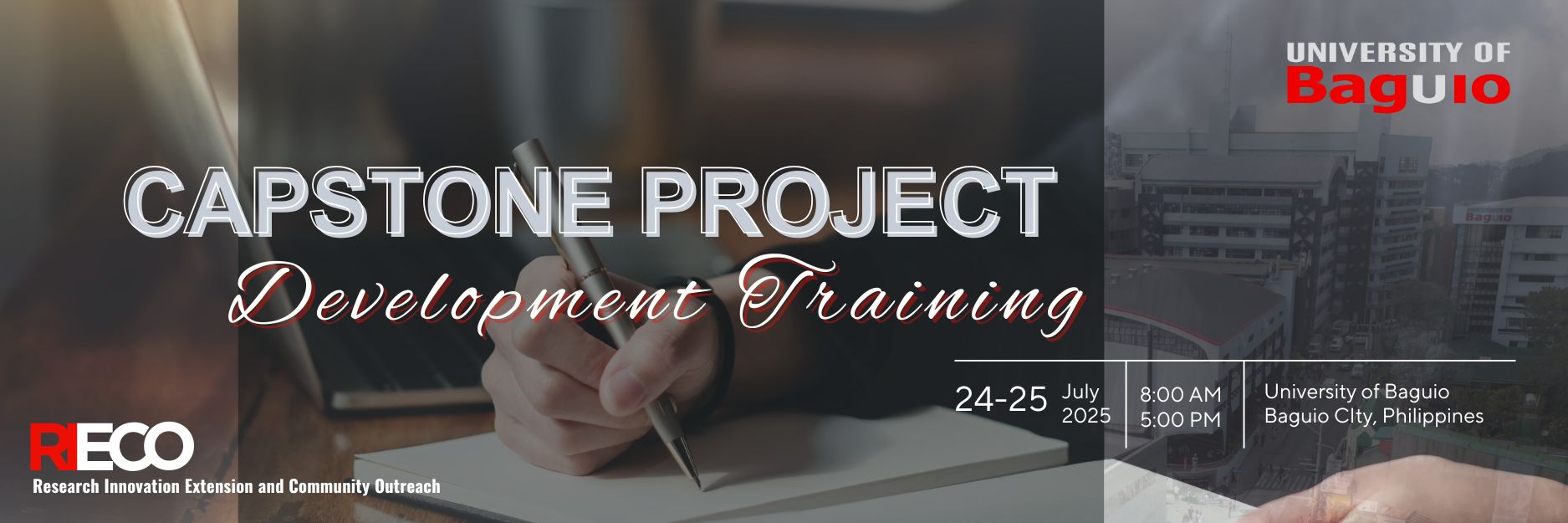
RATIONALE
The University of Baguio recognizes the importance of capstone projects as a culminating academic experience that integrates students’ knowledge, skills, and professional competencies across various disciplines. Given the university’s commitment to academic excellence and community impact, as reflected in its diverse programs and leadership initiatives, this two-day Harvard-style training program is designed to enhance the expertise of college instructors in preparing capstone projects. By leveraging proven frameworks and resources from Harvard and other established institutions, the training aims to strengthen instructors’ abilities to design, mentor, and assess capstone projects effectively, thereby enhancing the quality of student outputs and their readiness for real-world challenges.
Moreover, this training aligns with the University of Baguio’s mission to foster innovative, ethical, and socially responsive graduates who contribute meaningfully to their communities. The program’s integration of active learning, peer collaboration, and compliance with research ethics reflects the university’s standards for scholarly rigor and responsible research conduct.
By equipping faculty with advanced skills and practical tools, the University of Baguio ensures sustained improvement in capstone supervision that supports diverse student needs and project complexities. This initiative not only reinforces the institution’s reputation for academic leadership but also promotes a culture of continuous professional development among its educators.
OVERALL TRAINING OBJECTIVES
The training objectives for the two-day comprehensive capstone project preparation program are:
- Understand the influence of Systems and Design Thinking in the Capstone project conceptualization.
- Align capstone projects with program learning outcomes and institutional goals to ensure academic rigor and relevance to real-world challenges.
- Equip instructors with skills to design, scaffold, and mentor capstone projects effectively, using evidence-based frameworks and best practices from Harvard and peer institutions.
- Strengthen understanding and compliance with ethical research standards and IRB protocols to safeguard academic integrity and responsible project conduct.
- Foster collaborative peer learning and crisis management skills to support diverse student needs and address common challenges in capstone project implementation.
- Guide trainees to develop their own capstone project as a practical output of the training, reinforcing their mastery of design, implementation, and assessment principles. This ensures that participants not only gain theoretical knowledge but also apply it by creating a tangible capstone project prototype, which aligns with best practices emphasizing hands-on, integrative learning experiences crucial for effective capstone supervision
These objectives reflect the University of Baguio’s commitment to academic excellence, ethical scholarship, and the professional development of its faculty, aligning with its mission to produce graduates capable of meaningful community impact.
Day 1: Foundations of Capstone Project Preparation
Training Objectives:
- Understand Systems and Design Thinking as Tools for Transformative Problem-Solving
- Understand the role and significance of capstone projects in higher education, aligned with the University of Baguio’s academic standards.
- Learn to design capstone projects that integrate interdisciplinary knowledge and address real-world problems relevant to the Philippine context.
Schedule & Activities:
| Time | Activity | Resources |
| 8:00 – 8:30 | Preliminaries | |
| 8:30 – 10:00 | Lecture 1: From Insight to Innovation: Systems and Design Thinking as Tools for Transformative Problem Solving Introduction to systems thinking and design thinking as foundational mindsets in developing innovative capstone projects. Exploration of global and local complex challenges and how capstones can offer future-ready solutions. | Donella Meadows’ Systems Thinking Tim Brown Design Thinking |
| 10:30 – 12:00 | Lecture 2: Foundations of Capstone Project Design Examine Harvard Extension School’s capstone models, highlighting applied research, creativity, and community engagement. Align project goals with Philippine higher education outcomes and contextual needs. Use idea-generation tools (e.g., Crimson Education PH) and interdisciplinary frameworks to shape socially responsive projects. | Harvard Extension School Capstone Projects overview Philippine Commission on Higher Education (CHED) guidelines |
| 1:00 – 3:00 | Workshop 1: Capstone Project Design Brainstorming project ideas with a focus on local issues using interdisciplinary approachesUsing Crimson Education PH’s capstone project types and idea generation techniques | Crimson Education PH capstone project ideas and brainstorming framework |
| 3:30 – 5:00 | Peer Collaboration and Feedback Small group critiques on drafted project proposals using Harvard peer review principles | Harvard Extension School peer engagement model |
Day 2: Implementation, Mentorship, and Assessment
Training Objectives:
- Build mentorship strategies to guide students through the capstone journey effectively.
- Develop robust assessment rubrics combining quantitative and qualitative measures suitable for diverse disciplines.
- Equip instructors to manage common challenges and crises during capstone project implementation.
- Produce a capstone project proposal as a practical output of the training.
Schedule & Activities:
| Time | Activity | Resources |
| 8:00 -8:30 | Preliminaries | |
| 8:30 – 10:00 | Lecture 3: Ethical and Institutional Readiness Learn the core principles of ethical research and responsible conduct. Understand Harvard’s CUHS IRB lifecycle and adapt it to local institutional review processes in the Philippines. | Harvard Extension School advising guidelines University of Baguio mentoring best practices |
| 10:30 – 12:00 | Workshop 2: Assessment, Proposal Development, and Presentation Create fair, meaningful assessment tools using Oregon State University’s practicum templates, customized for local use. Guide participants in drafting and refining proposals that integrate design thinking, ethical standards, and contextual insight. | Oregon State practicum and assessment templates CHED quality assurance frameworks |
| 1:00 – 5:00 | Capstone Project Proposal Development and Presentation Trainees develop and present their capstone project proposals incorporating learned principles | Crimson Education PH project idea frameworks University of Baguio project guidelines |
Post Training Support
- Access to resources
- Monthly virtual follow-up sessions for peer support and troubleshooting
